ID |
Date |
Author |
Topic |
Subject |
|
2099
|
25 Feb 2021 |
Lars Martin | Bug Report | tmfe_main.cxx missing include <signal.h> | The most recent commit (b43aef648c2f8a7e710a327d0b322751ae44afea) throws this
compiler error:
src/tmfe_main.cxx:39:11: error: 'SIGPIPE' was not declared in this scope
signal(SIGPIPE, SIG_IGN);
It's fixed by adding #include <signal.h> to that file. |
|
2098
|
25 Feb 2021 |
Isaac Labrie Boulay | Bug Report | Undefined client causing issues in transition. | Hi all,
I'm currently experiencing an issue during run transitions. It comes in the form
of an alert saying "TypeError: Cannot read property 'length' of undefined"
whenever I'm in the "transition" window on mhttpd. I have attached an image of
what the transition window looks like when this happens.
By the looks of it and by peering at the lines in transition.html where the
error occurs, it's pretty obvious that there is some strange undefined client
that the web page tries to access.
I don't know how to find what this client is. Is there a way to see it in the
ODB?
The issues happens in show_client() of transition.html (called by callback()).
Here's the trace:
Uncaught (in promise) TypeError: Cannot read property 'length' of undefined
at show_client (?cmd=Transition:227)
at callback (?cmd=Transition:420)
at ?cmd=Transition:430
Any help would be very appreciated!
Thanks so much.
Isaac |
| Attachment 1: error_message.PNG
|
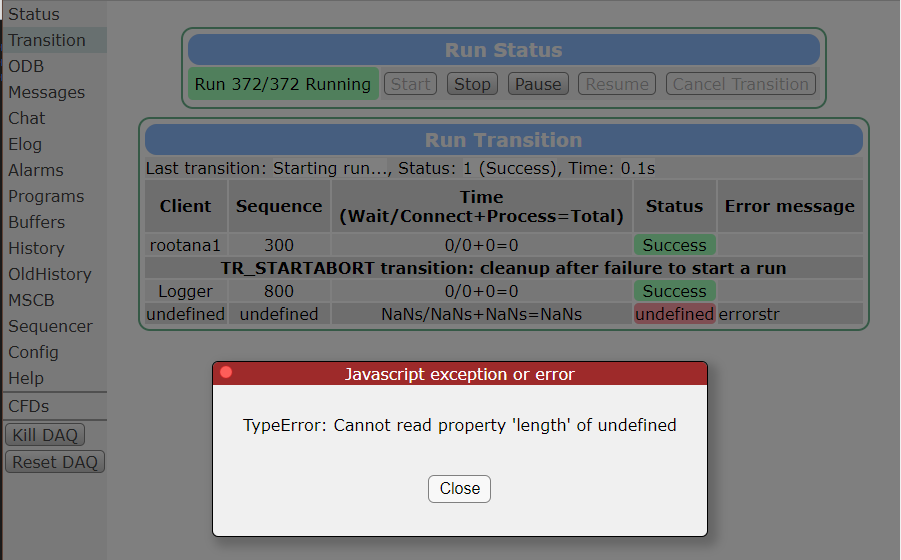
|
| Attachment 2: undefined_client.PNG
|
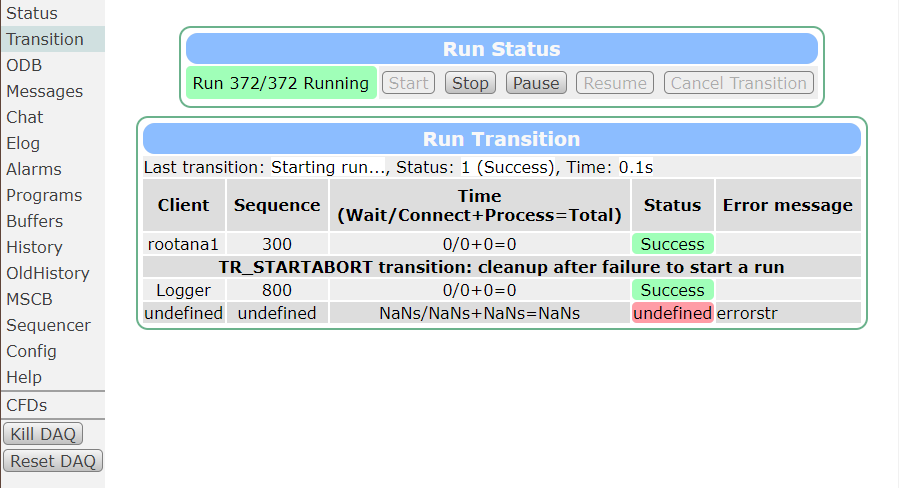
|
|
2097
|
25 Feb 2021 |
Stefan Ritt | Bug Report | history reload | I have to reproduce the problem. Can you please send me the full link by direct email. As you know, I'm also at PSI.
Stefan |
|
2096
|
24 Feb 2021 |
Zaher Salman | Bug Report | history reload | I have a history that is embedded in a custom page using
<div class="mjshistory" data-group="SampleCryo" data-panel="SampleTemp" data-scale="30m" style="'+size+' position: relative;left: 640px;top: -205px;"></div>
this works fine when I load the page but seems to cause a timeout when reloading (F5) the page. It used to work fine last year but since a midas update this year it does not work.
When I manually stop the script when firefox reports that it is slowing down the browse I get the following in the console:
Script terminated by timeout at:
binarySearch@http://xxx.psi.ch:8081/mhistory.js:1051:11
MhistoryGraph.prototype.findMinMax@http://xxx.psi.ch:8081/mhistory.js:1583:28
MhistoryGraph.prototype.loadInitialData/<@http://xxx.psi.ch:8081/mhistory.js:780:15
any ideas what may be causing this?
thanks.
Another hint to the problem, the custom page is accessible via
http://xxx.psi.ch:8081/?cmd=custom&page=SampleCryo&
once loaded the address changes to where A and B change values as time passes (I guess B-A=30m).
http://xxx.psi.ch:8081/?cmd=custom&page=SampleCryo&&A=1614173369&B=1614175169 |
|
2095
|
18 Feb 2021 |
Pintaudi Giorgio | Bug Report | Unexpected end-of-file | It appears that the issue is trigger by a nonexisting Event and Variable as shown
in the attached picture. This issue can arise when restoring the ODB from a
previous version or importing ODB values from other MIDAS instances.
It might be useful if the error message were more clear about the source of the
problem.
> Hello!
> Sometimes when I mess around with the history plots I get the following error:
>
> [mhttpd,ERROR] [history.cxx:97:xread,ERROR] Error: Unexpected end-of-file when
> reading file "/home/wagasci-ana/Data/online/210219.hst"
>
> I have tried the following without success:
>
> - Remove the MIDAS history files
> - Restart mhttpd and mlogger
>
> I do not know what triggers the error but when it triggers the above message is
> printed hundres of times a second, completely spamming the message log.
>
> It happened again today after I set the label of a frontend too long making
> mlogger crash. After fixing the label length, the above message appeared and it
> does not seem to go away. |
| Attachment 1: Screenshot_from_2021-02-19_15-41-23.png
|
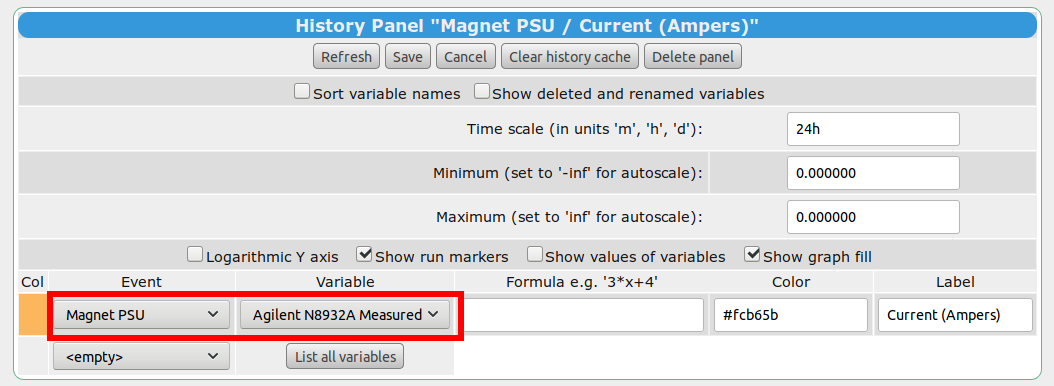
|
|
2094
|
18 Feb 2021 |
Pintaudi Giorgio | Bug Report | Unexpected end-of-file | Hello!
Sometimes when I mess around with the history plots I get the following error:
[mhttpd,ERROR] [history.cxx:97:xread,ERROR] Error: Unexpected end-of-file when
reading file "/home/wagasci-ana/Data/online/210219.hst"
I have tried the following without success:
- Remove the MIDAS history files
- Restart mhttpd and mlogger
I do not know what triggers the error but when it triggers the above message is
printed hundres of times a second, completely spamming the message log.
It happened again today after I set the label of a frontend too long making
mlogger crash. After fixing the label length, the above message appeared and it
does not seem to go away. |
|
2092
|
16 Feb 2021 |
Ruslan Podviianiuk | Forum | m is not defined error | Hello,
I see this mhttpd error starting MSL-script:
Uncaught (in promise) ReferenceError: m is not defined
at mhttpd_message (VM2848 mhttpd.js:2304)
at VM2848 mhttpd.js:2122
As I can see it does not affect work of MSL script but shows ReferenceError in
Midas sequencer (see picture).
Could please point me how to fix this error?
Thanks.
Ruslan |
| Attachment 1: m_is_not_defined.png
|
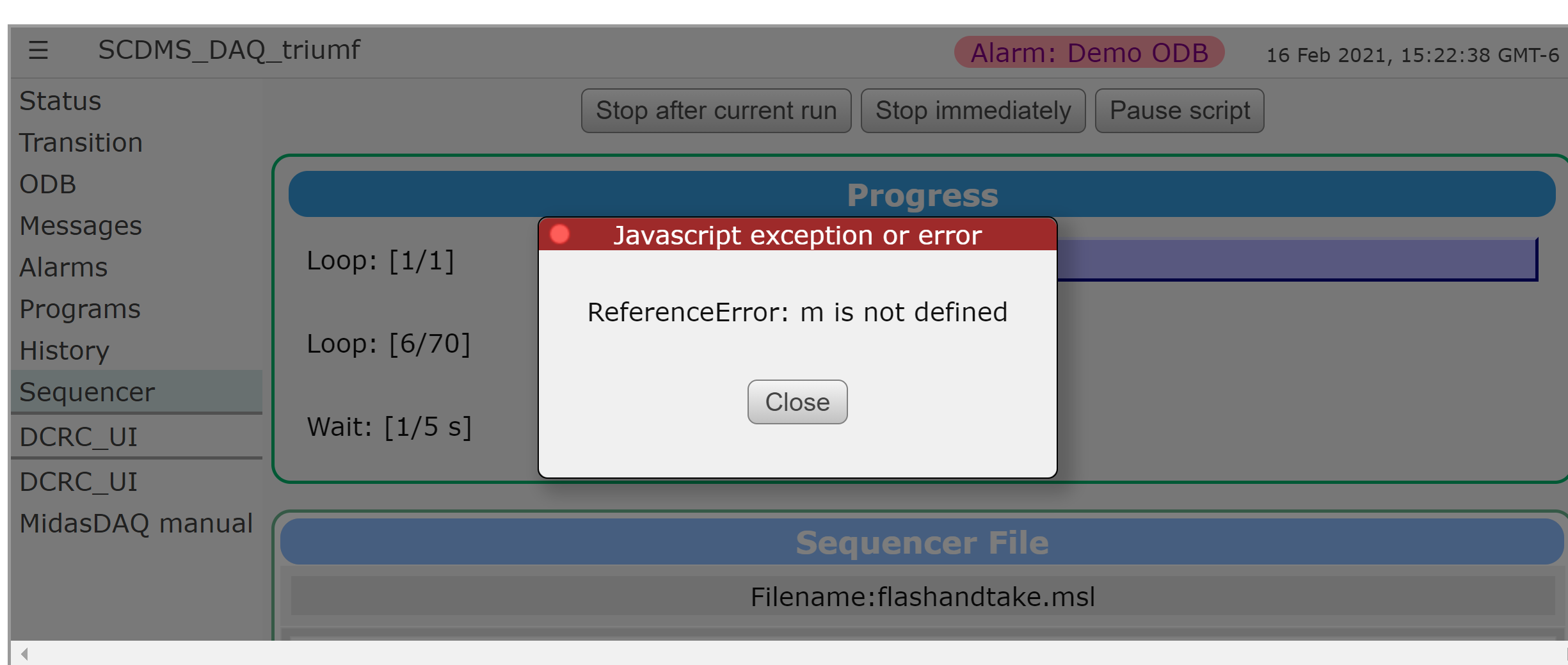
|
|
2091
|
12 Feb 2021 |
Konstantin Olchanski | Bug Report | mlogger history snafu | there is a problem with mlogger between commits xxx (17 Nov 2020) and a762bb8 (12 feb 2021). because of
confusion between seconds and milliseconds, FILE (mhf*.dat files) and SQL history are recording with
incorrect timestamps.
- traditional MIDAS history (*.hst files) does not have this problem (because of a buglet)
- midas-2020-12 release does not have this problem (it has mlogger from midas-2020-08 release)
there are some additional changes in mlogger that we are sorting out, when ready, we will make a new
release of midas.
K.O. |
|
2090
|
11 Feb 2021 |
Isaac Labrie Boulay | Forum | Javascript error during run transitions. |
> > I am encountering a Javascript error (TypeError: client.error is undefined) when
> > I transition between run states. Does anybody have an idea of what my problem
> > might be? I have pasted an example of what MIDAS logs during such sequences.
>
>
> Not enough information. Can you do this:
>
> a) for the javascript error, if you get it every time, open the javascript debugger
> and capture the stack trace? or at least the file name, function name and line number
> where the javascript exception is thrown?
I've attached a screenshot of the call stack showing the file names and line numbers.
> b) for the run start failure, start the run from odbedit "start now -v" or from
> "mtransition -v -d 1 START" (or "stop" as the case may be). capture the output, email
> to me directly or put in this elog here.
I have also attached a screen capture of the output.
Thanks for your help as always.
Isaac
> K.O.
>
>
> >
> > Thanks for all the help!
> >
> > Isaac
> >
> >
> > 09:24:08.611 2021/02/10 [mhttpd,INFO] Executing script
> > "~/ANIS_20210106/scripts/start_daq.sh" from ODB "/Script/Start DAQ"
> >
> > 09:24:13.833 2021/02/10 [Logger,LOG] Program Logger on host localhost started
> >
> > 09:24:28.598 2021/02/10 [fevme,LOG] Program fevme on host localhost started
> >
> > 09:24:33.951 2021/02/10 [mhttpd,INFO] Run #234 started
> >
> > 09:26:30.970 2021/02/10 [mhttpd,ERROR] [midas.cxx:4260:cm_transition_call,ERROR]
> > Client "Logger" transition 2 aborted while waiting for client "fevme":
> > "/Runinfo/Transition in progress" was cleared
> >
> > 09:26:31.015 2021/02/10 [mhttpd,ERROR] [midas.cxx:5120:cm_transition,ERROR]
> > transition STOP aborted: "/Runinfo/Transition in progress" was cleared
> >
> > 09:27:27.270 2021/02/10 [mhttpd,ERROR]
> > [system.cxx:4937:ss_recv_net_command,ERROR] timeout receiving network command
> > header
> >
> > 09:27:27.270 2021/02/10 [mhttpd,ERROR] [midas.cxx:12262:rpc_client_call,ERROR]
> > call to "fevme" on "localhost" RPC "rc_transition": timeout waiting for reply |
| Attachment 1: start_now_-v.PNG
|
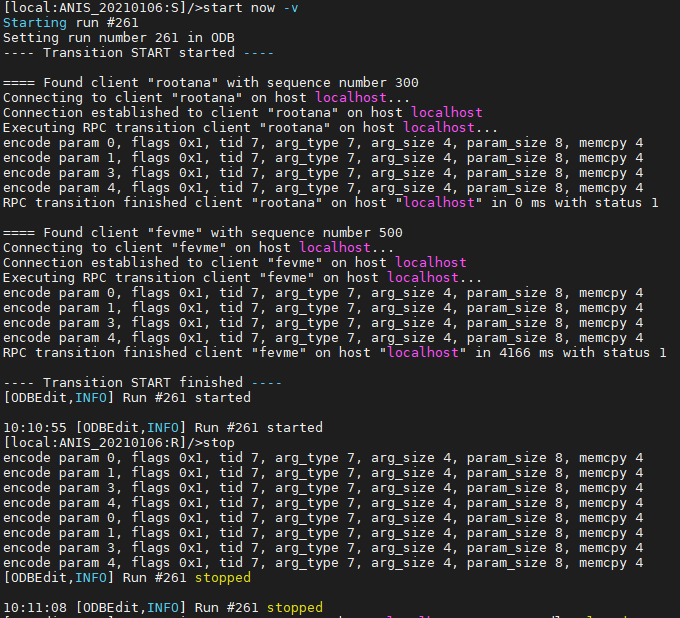
|
| Attachment 2: Call_Stack_for_JavaScript_Error.PNG
|

|
|
2089
|
10 Feb 2021 |
Konstantin Olchanski | Release | midas-2020-12-a | midas-2020-12-a is here, see https://midas.triumf.ca/MidasWiki/index.php/Changelog#2020-12
notable change from previous midas releases:
Use of ODB "Common" by mfe.c frontends has changed. New preferred behaviour
is to have the values defined in the equipment structure in the source code
to always overwrite values in ODB /Equipment/Foo/Common, except for the value
of "Common/enabled" (equipment_common_overwrite set to TRUE).
All mfe.c frontends will need to be modified for this change:
- for old behaviour (use ODB "Common"), add: BOOL equipment_common_overwrite = false;
- for new behaviour (use equipment values in the source code), add: BOOL equipment_common_overwrite = true;
The TMFE C++ frontend does not implement this change yet, it uses all "Common" values from ODB
and there is no way to overwrite things like the MIDAS event buffer name from C++ code. This may
change with the next version.
notable updates since midas-2020-08:
- new ODB variable /Experiment/Enable sound can be used to globally prevent mhttpd from playing sounds.
- Lazylogger now supports writing data over SFTP.
- odbvalue elements on custom pages now support an onload() callback as well as onchange(). Most elements now also
support a data-validate callback.
- custom pages can now tie a select drop-down box to an ODB value using modbselect.
- ability to choose whether the code or the current ODB values take precendence for the "Common" settings of an
equipment when starting a frontend. See elog thread 2014 for more details, and the "Upgrade guide" below for
instructions.
- minor improvements to mdump program - support for 64-bit data types and ability to load larger events if needed.
- minor improvements to History plots and Buffers webpage.
- bug fixes
plans for next development: major update of mlogger to simplify channel
configuration in odb, improvements to mhttpd multithreading, new history plot
configuration page, more c++ification.
To obtain this release, either checkout the top of branch release/midas-2020-12
(recommended) or checkout the tag midas-2020-12-a.
K.O. |
|
2088
|
10 Feb 2021 |
Konstantin Olchanski | Forum | Javascript error during run transitions. | > I am encountering a Javascript error (TypeError: client.error is undefined) when
> I transition between run states. Does anybody have an idea of what my problem
> might be? I have pasted an example of what MIDAS logs during such sequences.
Not enough information. Can you do this:
a) for the javascript error, if you get it every time, open the javascript debugger
and capture the stack trace? or at least the file name, function name and line number
where the javascript exception is thrown?
b) for the run start failure, start the run from odbedit "start now -v" or from
"mtransition -v -d 1 START" (or "stop" as the case may be). capture the output, email
to me directly or put in this elog here.
K.O.
>
> Thanks for all the help!
>
> Isaac
>
>
> 09:24:08.611 2021/02/10 [mhttpd,INFO] Executing script
> "~/ANIS_20210106/scripts/start_daq.sh" from ODB "/Script/Start DAQ"
>
> 09:24:13.833 2021/02/10 [Logger,LOG] Program Logger on host localhost started
>
> 09:24:28.598 2021/02/10 [fevme,LOG] Program fevme on host localhost started
>
> 09:24:33.951 2021/02/10 [mhttpd,INFO] Run #234 started
>
> 09:26:30.970 2021/02/10 [mhttpd,ERROR] [midas.cxx:4260:cm_transition_call,ERROR]
> Client "Logger" transition 2 aborted while waiting for client "fevme":
> "/Runinfo/Transition in progress" was cleared
>
> 09:26:31.015 2021/02/10 [mhttpd,ERROR] [midas.cxx:5120:cm_transition,ERROR]
> transition STOP aborted: "/Runinfo/Transition in progress" was cleared
>
> 09:27:27.270 2021/02/10 [mhttpd,ERROR]
> [system.cxx:4937:ss_recv_net_command,ERROR] timeout receiving network command
> header
>
> 09:27:27.270 2021/02/10 [mhttpd,ERROR] [midas.cxx:12262:rpc_client_call,ERROR]
> call to "fevme" on "localhost" RPC "rc_transition": timeout waiting for reply |
|
2087
|
10 Feb 2021 |
Isaac Labrie Boulay | Forum | Javascript error during run transitions. | Hi all,
I am encountering a Javascript error (TypeError: client.error is undefined) when
I transition between run states. Does anybody have an idea of what my problem
might be? I have pasted an example of what MIDAS logs during such sequences.
Thanks for all the help!
Isaac
09:24:08.611 2021/02/10 [mhttpd,INFO] Executing script
"~/ANIS_20210106/scripts/start_daq.sh" from ODB "/Script/Start DAQ"
09:24:13.833 2021/02/10 [Logger,LOG] Program Logger on host localhost started
09:24:28.598 2021/02/10 [fevme,LOG] Program fevme on host localhost started
09:24:33.951 2021/02/10 [mhttpd,INFO] Run #234 started
09:26:30.970 2021/02/10 [mhttpd,ERROR] [midas.cxx:4260:cm_transition_call,ERROR]
Client "Logger" transition 2 aborted while waiting for client "fevme":
"/Runinfo/Transition in progress" was cleared
09:26:31.015 2021/02/10 [mhttpd,ERROR] [midas.cxx:5120:cm_transition,ERROR]
transition STOP aborted: "/Runinfo/Transition in progress" was cleared
09:27:27.270 2021/02/10 [mhttpd,ERROR]
[system.cxx:4937:ss_recv_net_command,ERROR] timeout receiving network command
header
09:27:27.270 2021/02/10 [mhttpd,ERROR] [midas.cxx:12262:rpc_client_call,ERROR]
call to "fevme" on "localhost" RPC "rc_transition": timeout waiting for reply |
|
2086
|
08 Feb 2021 |
Stefan Ritt | Suggestion | mhttpd browser caching | > It seems that the only reliable way to bypass the browser cache is to add
> a tag with a random number to the URL ("&ts=currenttime").
Indeed that's the only reliable way to avoid caching across browsers. An alternative is
("&r=" + Math.random())
to add a random number.
> BTW, things like midas.js are also cached, and it is common to see problems
> after updating midas, where status.html is newly loaded, but midas.js is an old
> stale version from cache.
Reloading JavaScript file NOT from the cache is really tricky these days. I added a
special Google Chrome extension to clear my browser cache, which works reliably:
https://chrome.google.com/webstore/detail/clear-cache/cppjkneekbjaeellbfkmgnhonkkjfpdn
Stefan |
|
2085
|
08 Feb 2021 |
Konstantin Olchanski | Suggestion | mhttpd browser caching | > r->rsprintf("Expires: %s\r\n", str);
The best I can tell, none of this works in current browsers. with google-chrome,
I see it cache pretty much everything regardless of "expires", "no cache", etc
and anything else I tried.
Things like shift-<reload>, etc used to work to refresh the cache, but not any more.
So, I too, see confusing side-effects of caching, where I change something in ODB,
but "nothing happens". Then I scratch my head for 30 minutes until I remember
to open the javascript debugger where shift-<reload> (or is it ctrl-<reload>) actually works.
It seems that the only reliable way to bypass the browser cache is to add
a tag with a random number to the URL ("&ts=currenttime").
This is for HTTP GET requests. HTTP POST does not seem to be cached, so I do not worry
about this nonsense for json-rpc requests.
Perhaps we should do this random number trick for all user actions. User can
press buttons only so fast, we should be able to sustain the rate. Anything
loaded automatically or from a timer, we should allow caching.
BTW, things like midas.js are also cached, and it is common to see problems
after updating midas, where status.html is newly loaded, but midas.js is an old
stale version from cache.
Messy.
K.O. |
|
2084
|
08 Feb 2021 |
Konstantin Olchanski | Forum | poll_event() is very slow. | > I should mention that I was using midas/examples/Triumf/c++/fevme.cxx
this is correct, the fevme frontend is written to do 100% CPU-busy polling.
there is several reasons for this:
- on our VME processors, we have 2 core CPUs, 1st core can poll the VME bus, 2nd core can run
mfe.c and the ethernet transmitter.
- interrupts are expensive to use (in latency and in cpu use) because kernel handler has to call
use handler, return back etc
- sub-millisecond sleep used to be expensive and unreliable (on 1-2GHz "core 1" and "core 2"
CPUs running SL6 and SL7 era linux). As I understand, current linux and current 3+GHz CPUs can
do reliable microsecond sleep.
K.O. |
|
2081
|
25 Jan 2021 |
Thomas Lindner | Suggestion | mhttpd browser caching | I tried reloading the pages. If I reloaded the actual elog page
https://server.triumf.ca/?cmd=Elog
then it bypassed the cache and got the correct updated page from mhttpd.
However, if when I reloaded the status page
https://server.triumf.ca/?cmd=Status
and then clicked the Elog button then I just got the cached (old) page. Admittedly reloading the status page doesn't make so much sense (once I thought about it), but it is what I tried first (I'm good at modelling unexpected user behaviour); so there is some risk that the user will try reloading the wrong page and will be stuck not getting the external elog page (until 24 hours runs out).
Anyway, I will update the documentation to note that you need to reload the elog page after changing this variable. That's probably an adequate solution.
I certainly don't suggest getting rid of caching entirely. I was trying to think whether there was a set of pages where it would make sense to disable the cache (like the elog page). But maybe that will just cause more problems.
> Let me first explain a bit why caching is there. Once we had the case that someone from
> TRIUMF opened a midas custom page at T2K. It took about one minute (!) to load the page.
>
> When we looked at it, we found that the custom page pulled about 100 items with individual
> HTTP requests from Japan, each taking about one second for the roundtrip. Then we redesigned
> the custom page communication so that many ODB entries could be retrieved in one operation,
> which improved the loading time from 100s to about 2s.
>
> With the buttons we will have to make the same compromise. If we do not cache anything,
> loading the midas status page over the Pacific takes many seconds. If we cache all, any
> change on the midas side will not be reflected on the web page. So there is a compromise
> to be made. I thought I designed it such that the side menu is cached locally, but when
> the user presses "reload", then the full menu is fetched from the server. Of course one
> has to remember this, so changing the ELOG URL or other things on the menu require a
> reload (or wait a certain time for the cache to expire). So try again if that's working
> for you. If not, I can visit it again and check if there is any bug.
>
> If we go the route to disable the cache, better try this to T2K and see what you get before
> we commit ourselves to that. Last time TRIUMF people were complaining a lot about long
> load times.
>
> Best,
> Stefan |
|
2080
|
25 Jan 2021 |
Stefan Ritt | Suggestion | mhttpd browser caching | Let me first explain a bit why caching is there. Once we had the case that someone from
TRIUMF opened a midas custom page at T2K. It took about one minute (!) to load the page.
When we looked at it, we found that the custom page pulled about 100 items with individual
HTTP requests from Japan, each taking about one second for the roundtrip. Then we redesigned
the custom page communication so that many ODB entries could be retrieved in one operation,
which improved the loading time from 100s to about 2s.
With the buttons we will have to make the same compromise. If we do not cache anything,
loading the midas status page over the Pacific takes many seconds. If we cache all, any
change on the midas side will not be reflected on the web page. So there is a compromise
to be made. I thought I designed it such that the side menu is cached locally, but when
the user presses "reload", then the full menu is fetched from the server. Of course one
has to remember this, so changing the ELOG URL or other things on the menu require a
reload (or wait a certain time for the cache to expire). So try again if that's working
for you. If not, I can visit it again and check if there is any bug.
If we go the route to disable the cache, better try this to T2K and see what you get before
we commit ourselves to that. Last time TRIUMF people were complaining a lot about long
load times.
Best,
Stefan |
|
2079
|
25 Jan 2021 |
Thomas Lindner | Suggestion | mhttpd browser caching | I have a more subtle point about the new ODB key for using an external elog I mentioned in [1]. I was very confused after changing the ODB "External Elog" because mhttpd still wasn't using my external elog URL. I started trying to debug mhttpd.cxx, but found a lot of bits of mhttpd didn't seem to be getting called. I eventually realized that my browser had been caching the responses for some (though not all) of the MIDAS navigation buttons. Clearing my browser cache fixed the problem and allowed me to use the MIDAS button to the external ELOG. This caching happens on my macbook for both Firefox 84.0.2 and Safari 13.1.
Many of the requests to mhttpd end up going to send_fp(), where we explicitly set the cache time to 24 hours.
// send HTTP cache control headers
time_t now = time(NULL);
now += (int) (3600 * 24);
struct tm* gmt = gmtime(&now);
const char* format = "%A, %d-%b-%y %H:%M:%S GMT";
char str[256];
strftime(str, sizeof(str), format, gmt);
r->rsprintf("Expires: %s\r\n", str);
Some other MIDAS buttons don't seem to be cached by the browser; for instance the response for the 'OldHistory' button doesn't get cached.
Should we remove the cache instruction for at least some of the buttons? At least for the elog button where we want the link direction to get switched by an ODB key the caching seems a bad idea.
[1] https://midas.triumf.ca/elog/Midas/2078 |
|
2078
|
21 Jan 2021 |
Thomas Lindner | Info | Using external ELOG with newer mhttpd | A warning, in case others have the same problem I had.
In the past you could configure mhttpd so that the 'Elog' button would redirect to an external ELOG server; to do this you only needed to create and set the ODB variable '/Elog/URL' to the URL of your external ELOG server.
But with the newer MIDAS you need to set two ODB variables:
* "/Elog/URL" needs to be set to the URL of the external ELOG.
* "/Elog/External Elog" needs to be set to 'y'
I hadn't noticed this and was confused why my Elog button wasn't working after upgrading MIDAS.
MIDAS documentation was updated to reflect this change:
https://midas.triumf.ca/MidasWiki/index.php/Electronic_Logbook_(ELOG) |
|
2077
|
15 Jan 2021 |
Isaac Labrie Boulay | Forum | poll_event() is very slow. | > >
> > I'm currently trying to see if I can speed up polling in a frontend I'm testing.
> > Currently it seems like I can't get 'lam's to happen faster than 120 times/second.
> > There must be a way to make this faster. From what I understand, changing the poll
> > time (500ms by default) won't affect the frequency of polling just the 'lam'
> > period.
> >
> > Any suggestions?
> >
>
> You could switch from the traditional midas mfe.c frontend to the C++ TMFE frontend,
> where all this "lam" and "poll" business is removed.
>
> At the moment, there are two example programs using the C++ TMFE frontend,
> single threaded (progs/fetest_tmfe.cxx) and multithreaed (progs/fetest_tmfe_thread.cxx).
>
> K.O.
Ok. I did not know that there was a C++ OOD frontend example in MIDAS. I'll take a look at
it. Is there any documentation on it works?
Thanks for the support!
Isaac |
|